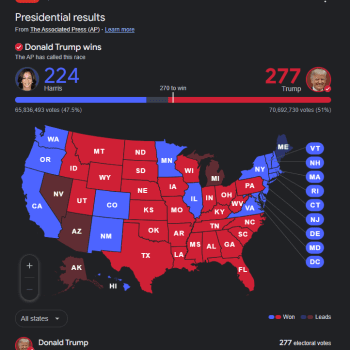I hope that those who appreciate puns as much as I do will like the title of this post, and that those who consider spelling of paramount importance will forgive me for it. At a time when our society is divided between those two camps, I am nailing my pun-making colors to the mast (and am by no means the first to make this pun). But as you have probably guessed, that isn’t the contemporary divide that I want to focus on in this post.
The value of studying the Bible at a moment like this is not that the Book of Revelation tells you what is going to happen in the coming days and years. Nor is it (despite what some claim) that it provides a moral framework that allows one to recognize one candidate as God’s anointed and the other as the antichrist.
Rather, the value of studying the literature and history of ages past in relation to this present moment is the way it helps us to see that these times of a president behaving in appalling ways, of anxiety about a return to civil war, of pandemic, none of them is in fact unprecedented.
What unfolds in the coming days may be traumatic or positive and perhaps both. But despite the characteristically American belief that we are the centerpiece of history and unique in our accomplishments and our experiences, none of that is true. Donald Trump is not the first head of state to sow division and fail to provide leadership. Americans in 2020 are not the first to believe they are waging a battle in which the opposition is in cahoots with the forces of darkness. Perhaps the most useful thing it provides is a reminder that our times are not in fact unprecedented.
The Bible isn’t about us, but it can speak to us in this present circumstance if we let it. But first we need to recognize that texts don’t speak. We are hearing voices of people from the past speaking to their own times in ways that can nevertheless be relevant to us. The United States is not featured in the Book of Revelation but we can learn something from its critique of the Roman Empire. The apostle Paul did not tell Christians to advocate for the abolition of same-sex relations from Greek society but we can learn from his message of inclusion and reconciliation. Amos did not address precisely our brand of capitalism and the Jubilee Law in Leviticus do not provide ready-made solutions to today’s problems, but there are certainly principles in them that are relevant.
Some have been using the Bible to garner votes and foster division. That too is nothing new. Others of us will refer to it regularly as we advocate a third way that stands for social justice and personal transformation while eschewing the mutual demonization that stands in the way of building something better for our future.
In these challenging circumstances, please stop looking for a precise match between some contemporary figure and the Beast of Revelation, that famous depiction of Roman imperial rule that many have mistaken for a prediction. Instead, look at what kind of individual and what kinds of communities the teaching and example of Jesus call his followers to be, and challenge anyone who has ears to hear to seek to live out. Instead of looking for a prediction of what will happen in the coming days and weeks, recognize that your own moral character or lack thereof, your love of enemy or belligerent hatred, is what will shape where we go from here. Even when the Bible offers a vision of the future, it takes the form of either a warning about a fate to avoid or a vision to strive for. If you think the Bible predicts unrest, war, and assorted strife, please recognize that it is not offering an instruction manual for how things ought to be but a warning about where our stubborn self-centeredness will lead us unless we change our ways.
Voting for someone who embodies moral character matters, of course, and if you have not yet voted I encourage you to do so. But the placing of hope in a political leader as though one person in the right position of power can unilaterally change things in a democracy is misguided. No one individual really has all the power even in a dictatorship. My big concern, however, to sum it up, is that there is rampant focus on individual politicians and equally rampant demonization of opponents, and yet very little introspection and self-criticism that might lead to becoming the kind of people that the teaching of Jesus (and most religious and moral figures) calls us to be.













